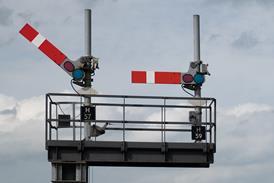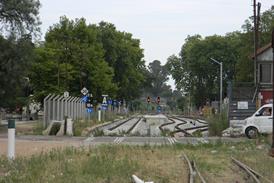DURING 2005 nearly 27 million trips were made on the 853 route-km Israel Railways network, more than three times as many as in 1999. If that sounds a spectacular increase, consider what ISR envisages in the future: no fewer than 65 million trips are expected in 2010.
The freight forecast is less dramatic but still ambitious: with 7·5 million tonnes carried in 2005, traffic is expected to more than double to over 17 million tonnes in 2009.
ISR’s grand plans reflect a massive increase in spending on rolling stock and infrastructure from 2·78bn shekels in 2005 to 5·47bn shekels in 2007. Another 23 stations will be opened as the network expands, while the number of daily trains will rise from 283 to 600.
Perhaps most ambitious of all is a large-scale electrification programme which will see 838 route-km wired in two stages; prequalification tenders for a framework contract were called last year (RG 7.05 p390). Priority will go to the 53 km route from Tel Aviv to Modi’in, followed by the main line north from Tel Aviv to Binyamina and Akko. Next priority would be to wire the proposed line from Akko to Karmi’el, together with the route to Jerusalem which reopened last year, and the new line from Tel Aviv to Rishon Le-Ziyyon. Options for a second stage cover 192 km.
Preparations for implementing the expansion programme include restructuring of ISR management - as announced by ISR Chairman Moshe Leon on December 22 - with new directorships set up to oversee the electrification programme and construction of the planned high speed line to Jerusalem. General Manager Ofer Linchevsky said that ‘guidelines for the reform include resolving the growing demand from the public for rail services and improving the added value offered to passengers’.
Another directorship will develop plans for the long-planned but controversial 175 km link from Har Zin to Eilat, for which a detailed report has been drawn up by US consultant Merkator Transport Group; among the recommendations is a suggestion that the line should carry double-stack container trains to and from Ashdod.
With electrification in mind, ISR selected Siemens on January 11 as preferred supplier for an initial tranche of 86 single-deck push-pull coaches under a contract expected to be worth 700m shekels. Options for up to 585 more cars could take the contract value to 5bn shekels over 10 years, with the supplier probably assuming responsibility for maintenance. These vehicles would augment ISR’s existing fleet and would be suitable for diesel or electric traction. First delivery would be in August 2007.
The Israeli government has meanwhile asked the European Union for €30m towards construction of the planned line linking Haifa to Beit She’an, from where it would cross the River Jordan to reach Irbid in Jordan.




















